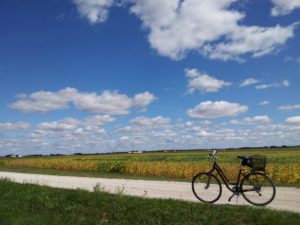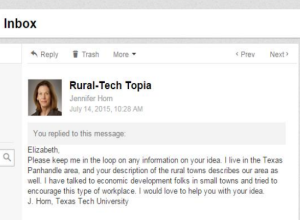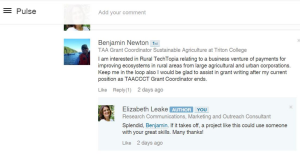 Thanks for the feedback regarding the July 11, 2015
Thanks for the feedback regarding the July 11, 2015
TechTopia post!
I’ll share what I receive on this page. It’s a thought-dump, and nothing here is set in stone. More input is needed.
BTW, it’s common for STEM-Trek community members who work with high performance computing to submit their suggestions anonymously. As stewards of data privacy and security, they’re exercising good judgement.
My comments are in italics, and I’ll continue to add fresh input at the bottom of this page. Since this is a work in progress, please forgive typos, errors & omissions.
Elizabeth Leake
Birds of a feather flock to the TechTopia concept!
Norman Walzer: Dr. Walzer founded the Public Policy Research Institute in 1974, and the Illinois Institute for Rural Affairs in 1988. He taught economics for nearly 30 years at Western Illinois University, and is currently a Senior Research Scholar in the Center for Governmental Studies and Grad Faculty Scholar in Political Science and Public Administration at Northern Illinois University. Few understand the longitudinal economic factors that have impacted U.S. rural communities better than Dr. Walzer. We’re truly honored to have his help as a project adviser.
Jennifer Horn: Horn has been with Texas Tech in Lubbock, Texas, for nine years, currently serving as Director of Translational Research and Entrepreneurialism. Before that, she was a staff attorney with the Seventh District Court of Appeals, and Associate General Counsel with the Texas Tech University System. She is interested in following our progress, and would make a tremendous adviser when the project takes flight! Perhaps we could explore the possibility of a Texas-TechTopia since Lubbock and Lincoln have similar challenges. She recommends involving local extension offices (National Institute of Food and Agriculture’s Cooperative Extension System (CES-USDA) and 4-H clubs (Future Farmers of America, too?).
Great suggestions. Thanks, and welcome, Jennifer!
Benjamin Newton: Newton is a grant coordinator on a sustainable agriculture project at Triton College. When his current grant ends, he would be interested in volunteering to advise his project. He has a master’s in Environmental studies, and is pursuing a PhD at Southern Illinois University in Environmental Resources and Policy.
Newton is currently involved with the development and review of curricula and coordination of faculty associated with a new AAS in Sustainable Agriculture & Sustainable Landscape Practices, as well as certificate programs in Sustainable Agroecology and Sustainable Food Production.
It’s great to meet you, Ben! Thanks for taking notice, and welcome.
Cathy Wilhite: With baccalaureate degrees in Animal Science and Economics, Wilhite earned an executive Masters of Business Administration degree after 15 years with Ralston Purina and Cargill in their feed and grain divisions. She then served as chief executive officer or executive director of nonprofits and nonprofit workforce development projects for the federal government in Washington DC. Fortunately for TechTopia, Wilhite has vast experience with identifying, writing and administering grants. Since returning to Lincoln recently, she has worked as a strategic planning consultant, with significant emphasis on resource and asset sustainability for nonprofit clients.
Welcome, Cathy! TechTopia needs someone with your experience and connections. Thanks for volunteering your time to help us get the ball rolling.
From Andree Jacobson, New Mexico Consortium: PRObE supports a hardware donation/refurbishing program that up-cycles high performance computing resources for use at universities for light research and workforce development. The program itself is a learning laboratory since students provide labor while learning a variety of useful skills.
On a related note, I launched a survey to determine how many would adopt gently-used HPC for light research and workforce development purposes. More than 70 responded favorably. Watch my LinkedIn post for updates.
From Richard Coffey, Argonne: Check out Project Design and If you Build It! Both projects focus on building community and engage high school students with the process. “If You Build It” was sponsored by a nonprofit organization called “Project H.” It was inspired by architects who developed a program to inspire constructive creativity in rural communities. Director Emily Pilloton presented at EDUCAUSE: If You Build It: The Power of Design to Change The World.
Thank you for sharing these links, Richard. You’ve underscored why it’s so important to travel, and take time to attend important conferences, like EDUCAUSE.
Feedback from email, LinkedIn & FaceBook:
R. F. (Retired Tech Professor. Massachusetts): Techies are social creatures as all humans are. So strong social structuring must be done. Techies need LOTS of bandwidth. They have to be able to get to the ‘outside’, as needed, e.g., to go to physical meetings, often held in interesting locations. Robert Metcalfe wrote, some time ago – if you’re living in a rural area and don’t have Ethernet (which he invented), Move! Nowadays, ‘Ethernet’ means the Internet.
I agree, RF!
Travel is essential (that’s why I formed STEM-Trek). Access to a major international airport is useful if you take more than one trip per month. Regional, secondary hops can be time-wasters. That’s why I thought the high-speed rail will make Logan County a good TechTopia location since Chicago’s O’Hare offers the most direct flights (in the midwest). If you bring carry-on luggage, navigating the train system to O’Hare isn’t horrible, and a lot easier if you’re meeting someone downtown.
Technical limitations are often easier to overcome than interpersonal or cultural barriers. The project should actively facilitate opportunities for social engagement that strive for inclusion and acceptance.
I once facilitated meetings for a rural telecommunication cooperative that wanted Internet delivered to a region in west-central Illinois. If you’re unfamiliar with the concept, rural cooperatives began to form in the 1930’s when 90% of urban areas were electrified, but only 10% of rural regions had power lines (let alone service). Since individuals were responsible for the last mile/s (there might have been one, or two farms per square mile, or miles in between), the hardware was cost-prohibitive during the Great Depression (1929-1939). Because electricity (like the Internet) was becoming essential to their livelihoods, in 1936 President Roosevelt formed the Rural Electrification Administration (REA) to provide coop financing. The same strategy was used for telecommunications.
I was first asked to help this group form a “team.” As their chair explained, they had a difficult time reaching decisions. He thought that after generations of fence-building, some had become “too territorial” to achieve consensus or even contribute to a healthy discussion. Perhaps that’s why farmers’ collective bargaining groups came to be called “cooperatives.”
After several Weds. night team-building exercises, they coalesced; it was gratifying to watch the barriers fall. My part was easy, and they were willing to do the work in order to achieve their common goal. Then, with a united front, they appealed to the only provider that served the region. The carrier had been reluctant to add infrastructure to less profitable, rural regions (not enough pay-per-view, ESPN, or Disney subscriptions; Internet was an add-on to a TV subscription).
When I was working with NIUNet (2003-7), I attended several Internet2 meetings. I was surprised to learn there was a vast Chicago suburban region that lacked access to broadband. Period. Residents couldn’t subscribe if they wanted to. Again, without a market, providers didn’t invest in a delivery system.
By the mid 2000’s in rural Northern Illinois (that is very flat), it was common to use microwave technology from the most prominent structure on the landscape (usually a grain elevator) where line-of-sight allowed. This also required a collaborative investment. Some regions are too mountainous, and/or far from a source. Satellite Internet is more affordable for individuals today, but I’m not sure if it’s robust enough for TechTopia. The project needs a network adviser.
Colleagues who worked with Navajo Technical University (and collaborators), on the Internet to the Hogan project could share lessons learned with similar regions that have unique cultural challenges.
Today, fewer are held hostage by a single commercial carrier (or even a wire). In the face of climate change, a stronger case can be made for agricultural regions (data-gathering arrays to inform precision agriculture, for example.).
In Metcalfe’s honor, if it doesn’t exist, TechTopia will probably build it.
R.V-B (Human Factors Engineer/Assistive Tech Development. Illinois): Why not something like Del Webb planned communities, and add a common tech barn? Here’s a sustainable model from the Sierra Club (green living doesn’t have to be miserable):
http://vault.sierraclub.org/sierra/201007/comfortzone.aspx
It would be cool if TechTopia enjoyed energy sovereignty. I wonder if current battery storage technologies would handle all applications, or if the source would wane a few hours after dark, preventing all-nighters? Maybe TechTopia could be a proving ground for beyond-lithium innovation? The project needs energy advisers and/or residents who work remotely from DoE facilities in northern Illinois?
T. S. (Self-employed entrepreneur. Washington): I strongly encourage you to think outside of just tech people and open it to others who work from home (like artists). The strength of a homogeneous community will be much lower than one that welcomes different perspectives and skills.
Hey, TS! You’re talking to someone with an arts & humanities background, and I couldn’t agree more. While personalities vary, the creative process, whether it’s designing a turbine or a piece of fine art, is similar. The project would benefit from a fine arts adviser.
Someone else suggested that we welcome veterans, and I agree. As a STEM-Trek focus group, I know they would bring a wealth of experience to the community. Many veterans have had to adapt to disability, as have farmers with work-related injuries. The Purdue-based AgrAbility project has inspired assistive technology and other solutions to help farmers do their work. An expert assistive technology/user experience adviser would be helpful.
L.S. (DevOps Engineer, Commercial. Illinois): Good afternoon! I work from home for a California-based tech company, but live and work in a mid-sized Illinois town. In addition, I grew up in rural Virginia and never went back, in large part because of the lack of jobs for tech workers like me — and, now that I work at home, because of the lack of like-minded people in the community there.
I’m interested in following the discussion about this topic. While I don’t have a specific article to submit, I’ve thought a lot about these issues and would be interested in talking about it more and in following developments.
Thanks, LS. I am glad you joined the thread. Seven generations ago, my family farmed in Dinwiddie County, Virginia.
I mentioned the importance of a technical, psycho-social support system, and that seems to resonate with you. Since TechTopia would blend communities that don’t normally interact, there could be some culture shock. Again, a good support system might prevent conflict. An adviser with a psychology or sociology background would be helpful.
G.J. (CI Director and Professor. Hawaii): Elizabeth, there is an interesting, grass roots movement in downtown Honolulu –http://www.ourkakaako.com/. Off to a good start with the huge challenge of affordable housing and a growing homeless population.
There’s the art influence again!
When I covered the University of Chicago’s US-RCN, UrbanCCD meeting a few years ago, I had the pleasure of meeting Robert Sampson who wrote “Great American City: Chicago and the Enduring Neighborhood Effect.” I enjoyed reading his book, and I recall one chapter noting the positive learning and social outcomes for children who grew up in Chicago’s bohemian neighborhoods (places where artists, thespians and writers congregate). He attributed the success to the collective fostering of neighborhood children. Perhaps TechTopia should accommodate artists, and families? Thanks, GJ!
T.B. (HPC software developer/at a U.S. national laboratory):
I enjoyed reading about your STEM-Trek project.
I’m not a gardener myself, however, one thought I had was that such the Rural-TechTopia you describe would probably attract folks with the skills and interest to raise food on a small scale, say a vegetable garden to provide produce to the residents of the center.
Seems like an interesting synergistic opportunity. Diversifying beyond technology might make the center more robust. I can also imagine the center operating an automotive repair and maintenance shop, providing call center services, perhaps running a small restaurant, etc., depending on the interests of the participants.
Hi, T.B. Thanks for this valuable input. I agree about the community having an interest in locally-sourced food, and it might even generate income via sales to a local farmer’s market.
There’s a huge demand for automotive and mechanical maintenance in the central Illinois region. Plus, not everybody could or should accrue debt to attend college. By partnering with local trucking, automotive maintenance and the local high school, a technical-vocational center would provide training, internships, jobs, and a much-needed service to the community. In Lincoln’s case, this could feed the workforce pipeline for manufacturing jobs in all satellite towns. Also, it makes the community more attractive to industry if there’s a ready-made workforce.
Depending on the final scope, I agree it needs a coffee shop, pub or another nearby place where residents can occasionally escape from their home-offices.
Allowing residents to weigh-in on the development is a great idea, and we would want to involve stakeholders from the community before launching new offerings. If it doesn’t provide local businesses with mutually-beneficial synergies, or if business-owners don’t understand the value it brings to their community, they might perceive it as a threat. It must complement and extend existing entities, not run anybody out of business. It’s all about economic revitalization and growth.
T.S. Bozeman, MT:
It should be easier to deliver broadband to rural regions in the future. Check out latest from the Whitehouse Broadband Opportunity Council, August 2015 report. TechTopia would be useful in tribal territories, too.
Thanks, everyone. Please keep your suggestions coming!!! Send them to info@stem-trek.org, or find me on FaceBook.
Elizabeth Leake
 Relevant topics in the news:
Relevant topics in the news:
Overprescribed, and Under-funded: Illinois’ Surge in Overdose Deaths (Medill Reports, Chicago, Feb. 24, 2016)
NerdWallet ranked the top 100 U.S. towns for quality of life for STEM grads. Central Illinois’ Peoria ranked 13, and Bloomington ranked 27. (April 26, 2016).


